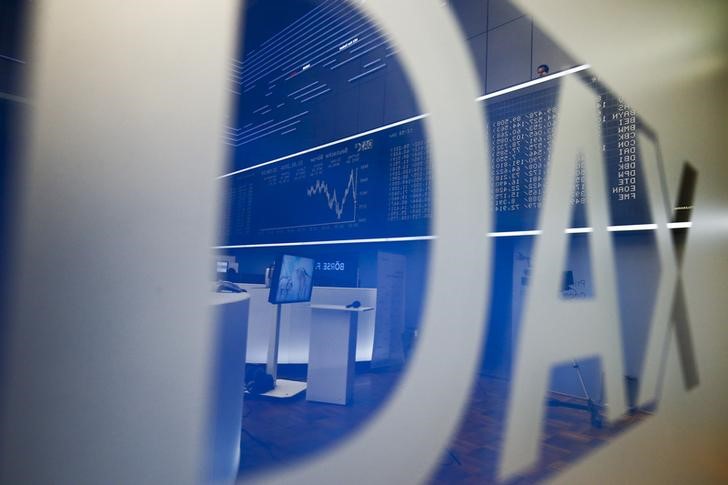
European equity indices edged higher Friday at the end of a volatile week, amid a great deal of uncertainty over the state of the global economy given a heated trade war between the U.S. and China.
At 03:05 ET (07:05 GMT), the DAX index in Germany climbed 1%, the CAC 40 in France gained 1% and the FTSE 100 in the U.K. rose 0.6%.
The pan-Europe Stoxx 600 index gained 0.7%.
Fears of a sharp downturn in the global economy hit European stock markets hard at the beginning of the week, to be followed by a brief relief rally after U.S. President Donald Trump paused the majority of his tariff threats.
The regional Stoxx 600 index had closed 3.7% higher Thursday, marking its best day in three years, as markets sought to recover losses sustained in the previous sessions.
However, trade policy uncertainty persisted, with the U.S. and China imposing higher and higher tariffs on each other throughout the week – with the White House on Thursday signalling that the cumulative tariff rate on China now would effectively total 145%.
Indeed, French President Emmanuel Macron said earlier Friday that Trump’s decision this week for a 90-day suspension on tariffs he had imposed on countries gave room for only a ’fragile pause’.
There was some positive economic news for investors to digest Friday, after data showed that Britain’s economy grew at a faster rate than expected in February.
Gross domestic product grew by 0.5% on the month in February, well above the expected expansion of 0.1%, while the economy grew by 1.4% compared to a year earlier, according to data from the Office for National Statistics.
Elsewhere, German inflation eased to 2.3% in March, the federal statistics office said on Friday, confirming preliminary data and suggesting that inflationary pressures from the eurozone’s largest economy remain subdued.
In corporate news, auto giant Stellantis (NYSE:STLA) said its first-quarter shipments were down 9% compared to last year, to an estimated 1.2 million vehicles.
Stellantis said the drop primarily reflected lower North American production due to extended holiday downtime in January, as well as product transition and lower light commercial vehicle sales in Europe.
Fraport (ETR:FRAG) saw flat passenger growth in March 2025, with travel disrupted by a strike that affected about 140,000 passengers. The airport handled around 4.6 million passengers during the month, a marginal increase of 0.3% from the previous year.
A lot of attention will also be on the start of the U.S. earnings season, with the likes of JPMorgan Chase (NYSE:JPM), Citigroup (NYSE:C) and Wells Fargo (NYSE:WFC) set to release their results later in the session.
Investors’ focus will likely shift from profits to bank bosses’ remarks on the economy given the uncertainty generated by President Trump’s tariffs policy.
Oil prices edged higher Friday, but were on course for a second consecutive losing week on concerns the escalating trade war between the U.S. and China, the two largest economies in the world, will hit economic activity and thus demand for crude.
At 03:05 ET, Brent futures climbed 1% to $63.95 a barrel. U.S. West Texas Intermediate crude futures rose 1% to $60.69 a barrel.
Both benchmark contracts are set to drop around 4% this week, adding to their 11% falls in the prior week.
Earlier this week President Trump postponed plans to impose reciprocal tariffs against most countries by 90 days, but he still proceeded with increased tariffs on China.
U.S. tariffs on Chinese goods now stand at 145%.
Beijing decried the move, retaliating with its own tariffs earlier this week, while also vowing to “fight to the end.”
Traders feared that a significant U.S.-China trade war will hurt oil demand, especially given that China, the world’s biggest oil importer, faces steep trade tariffs.